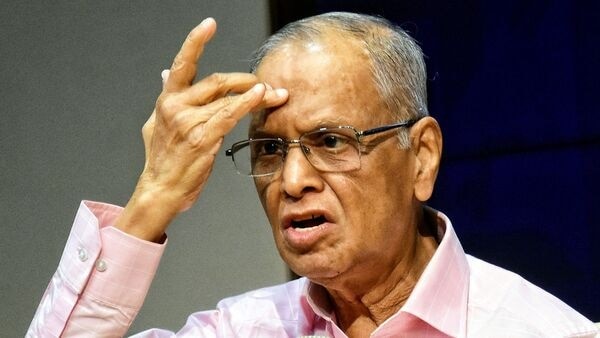
Narayan Swamy said he has not seen anybody in the world achieve anything without hard work. "Performance leads to recognition, recognition leads to respect, and respect leads to power. If India wants power, it has to perform," he added.
Narayana Murthy renews call for 72-hour work week, cites China’s 9-9-6 model
Infosys co-founder also claimed Prime Minister Narendra Modi works 100 hours a week, urging young professionals to work longer hours for India's rapid growth

Infosys co-founder Narayana Murthy has once again shared his views on work-life balance, productivity and the culture of long working hours.
In a recent interview, the 79-year-old billionaire referenced China’s well-known 9-9-6 work culture to reinforce his belief that Indians should work longer hours for the country to grow at a faster pace.
Also Read: Infosys urges employees not to work longer hours, ensure work-life balance
Murthy had previously sparked widespread debate in 2023 after suggesting that Indians ought to work 70 hours a week for nation-building.
'Get a life before work-life balance'
In an interview with Republic TV, Murthy not only reiterated the need for Indians to work 72 hours a week but also claimed that Prime Minister Narendra Modi works 100 hours a week, portraying the PM as an example young professionals should follow.
When asked a question about work-life balance, which the interviewer described as a “Gen Z question”, Murthy responded by recalling a remark from a fellow corporate leader. “He gave a brilliant answer. He said, ‘Sir, first we should all get a life, then we should worry about work-life balance’,” Murthy said.
“The country’s need is for those of us whom God has smiled upon to work hard, work smart, and in a disciplined manner, and create opportunities for those who still do not have any jobs, so that they too can have a life. Only then can we discuss work-life balance,” he added.
Also Read: 70 hours workweek? Narayana Murthy says he is all for it, but none should demand it
Murthy went on to say, “My personal view is that I haven’t seen anybody in the world achieve anything without hard work. Performance leads to recognition, recognition leads to respect, and respect leads to power. If India wants power, it has to perform. No amount of words will do.”
China's 9-9-6 work culture
“There is a saying in China, 9, 9, 6… 9 am to 9 pm, six days a week. And that’s a 72-hour week,” Murthy said. Citing China’s approach to productivity, Murthy noted that young Indians should be prepared to work harder if they want the country to progress at a similar speed.
The 9-9-6 rule refers to a once-common work schedule in Chinese tech companies, where employees worked from 9 a.m. to 9 p.m., six days a week, totalling 72 hours.
The practice gained traction during China’s tech boom, especially in companies like Alibaba and Huawei, but drew strong criticism for causing exhaustion, stress and poor work–life balance.
In 2021, China’s Supreme Court declared the schedule illegal, though enforcement is inconsistent.
Key to progress
Responding to a question on whether India could realistically overtake China in manufacturing or other sectors, Murthy said he believes it is possible, but only through sustained effort.
He noted that India has been growing at around 6.57 per cent annually, which he described as a “reasonable pace”, but said catching up with China will require extraordinary commitment from all sections of society.
Also Read: 'We are not from backward class': Sudha Murty, Narayana Murthy opt out of Karnataka caste survey
“If we have great ideas, and if we back them up with extraordinary action in every aspect, every citizen, every bureaucrat, every politician, every corporate leader, every civil society leader, I do think we can do it. But the job is not easy,” he said.
Murthy stressed that progress will depend on individuals setting high standards for themselves. “We must realise the job is not easy. It requires each one of us to set high benchmarks for our own actions. And it is the sum of all these efforts that will help India reach China,” he added.

